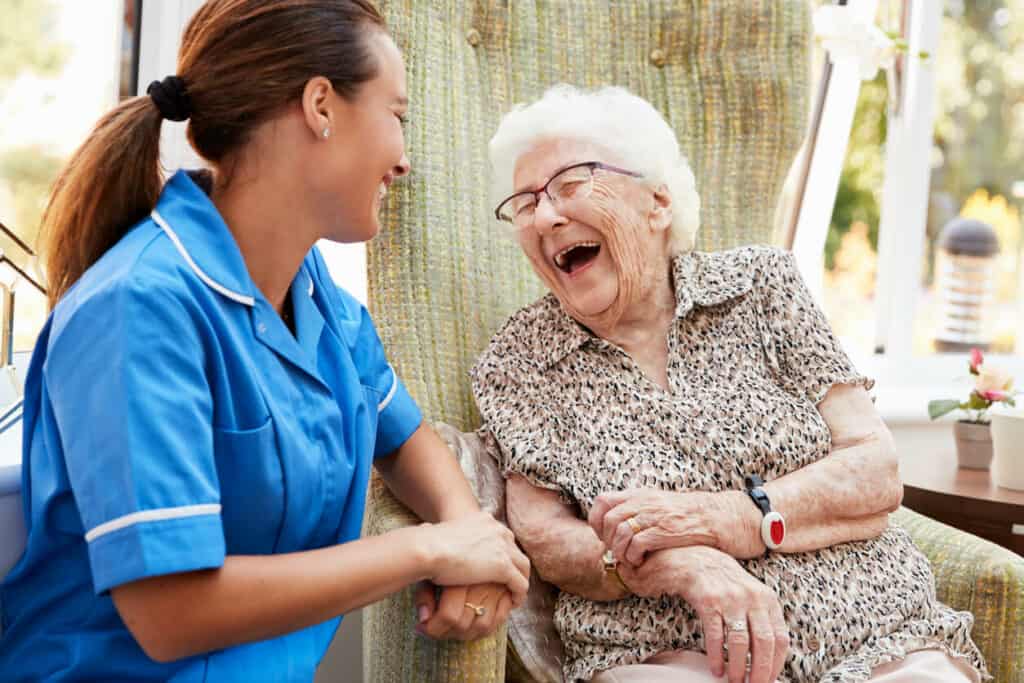
As we age, we need special attention and care to lead a quality life free of anxiety, fear, and the daily worries accompanying old age. Sadly, most people don’t understand what most seniors need as they age, leading to neglect and sometimes even elder abuse.
If you have a senior living with you or at home, you want to do everything possible to ensure their golden years are comfortable.
Senior caregiving is essential to ensuring your loved one enjoys their old age after years and years of looking out for you.
In some cases, you’ll be one to provide care and look after your elderly loved one, and combining caregiving with other responsibilities such as family or work can lead to caregiver strain.
If you’re already experiencing caregiver strain, you can bring in a professional caregiver to care for them while you take a break. Additionally, you can learn more about what causes caregiver strain, and how you can avoid it.
Some of The Challenges That Caregivers Face
Recent studies show that about 34.2 Americans provide unpaid caregiving services to their aging loved ones. A caregiver can spend up to 40 hours a week caring for their loved one.
Although caregiving is a noble career, it is a challenging one. As a caregiver, you must sacrifice a lot to ensure your loved one is healthy, comfortable, and has everything they need. You must invest your time, energy, and money into caring for your aging parent or loved one.
Recognizing and addressing several unique challenges to make your caregiving journey smoother is essential.
Once you recognize and address these challenges, you will be better equipped to take care of your own needs and practice self-care as neglecting your needs could harm your health and the well-being of the person you care for.
Some of these challenges include
- Mental and physical stress
- Time management
- Financial strain
- Lack of privacy
- Isolation
- Lack of enough sleep
- Depression
Overview of the Types of Care that Seniors Often Need
Your elderly loved one might find it difficult to admit and even ask for help, and you may also find it difficult to admit your loved one needs assistance. With many readily available options, you and your senior loved one can find the help they need without sacrificing your independence and freedom.
When you realize it’s time for full-time care for your loved one, knowing the level of care they need will help you to be more prepared. You will want to know if you will engage the services of senior caregivers, medical aides, and nursing aides or if your parents will have to move to an assisted living facility for optimal care.
Although most parents want to age from the comfort of their homes, where they feel in control of their lives and retain a semblance of their normal lives as much as possible, it’s essential to check on your parents from time to time to know if they need to move or if having a part-time caregiver is the best option.
For example, if your dad has mobility issues, would it be safe to be alone, or would you rather have someone nearby to assist if he needed help? What if your mom’s dementia symptoms are advancing? You must consider whether transitioning your loved one into an assisted living home is the best option.
If you aren’t sure what the best care option is for your loved one, consider some of the following available options.
Companions or Housekeepers

A companion is ideal for an aging loved one, especially if they struggle with mobility issues. A companion or a housekeeper will assist your loved one with house chores such as:
- Light cleaning
- Putting groceries away
- Meal preparations
- Helping your loved one get into and out of the bathroom
- Making beds
- Accompany a your loved on their daily walks
- Watch a movie together
- Join your loved one carry out their hobbies.
Part-time Caregiver
A part-time caregiver usually visits a senior’s home a couple of times a week to help with various tasks like:
- Grooming
- Light cleaning
- Accompany your loved one to social events
- Drive your loved one to their appointments.
Full-time Caregiver
When you engage the services of a full-time caregiver, they will be at your aging loved one’s home for most of the week.
For example, depending on your agreement, they may be with your parents from Monday to Friday and even on weekends. When they are off-duty, you can chip in or look for respite care to ensure your elderly loved one has round-the-clock care.
A full-time caregiver will assist your loved one with light cleaning, grooming, gardening, and companionship. They might not offer medical services like injections unless they are certified to do so.
Live-in Caregiver
This type of caregiving is available to seniors who live alone and need full-time or round-the-clock care. For example, suppose your loved one has advanced dementia or cerebral palsy, in that case, they will greatly benefit from having a live-in caregiver.
Visiting Nurse
A senior will benefit from the services of a visiting nurse if they have a medical condition that requires a nurse to administer drugs, dress a wound, and check their vitals.
Understanding Caregiver Strain and its Impact
Caregiver strain is the burden a person caring for a disabled or chronically ill elderly loved one has to bear. Caregiver strain relates to your well-being as a caregiver, and understanding it will equip you to face and address it.
Caring for your spouse or elderly relaative puts you at a higher risk of caregiver strain. Although caring for a loved one can be fulfilling, it can take a toll on your emotional, physical and mental, health.
Once you understand the challenges you will face as a caregiver, you will be in a better position to learn effective coping mechanisms, which will go a long way in ensuring you provide excellent services to your loved one.

Caregiver Burnout Risk Factors
While caring for your loved one, you may feel frustrated, guilty, angry, sad, and sometimes alone. The culmination of these emotions is caregiver strain or burnout.
Some of the risk factors of caregiver burnout are:
- Social isolation
- Being female
- Depression
- When you live with an older person, you are taking care of
- Financial challenges
- Spending a lot of hours caring for your loved one
- Lack of problem-solving skills
- When you are a caregiver due to lack of choice
Common Causes of Caregiver Strain
Physical demands
Caring for older adults will usually involve:
- Assisting them with mobility.
- Helping them in and out of bed.
- Assisting them in getting in and out of the car.
Sometimes you will have to lift them if they suffer paralysis, which may result in back injuries, chronic pain, and physical strain.
Emotional and mental stress
During your caregiving journey, you may experience frustration, feel helpless, and feel guilty. You will constantly worry about your loved one’s well-being, which may affect you emotionally and mentally.
Social isolation
As a caregiver, your day will be full of caregiving responsibilities, leaving you with no room for socializing with your family and friends. Sometimes, you will feel overwhelmed by your responsibilities, and your friends or family members won’t understand what you are going through.
Caregiver Strain Symptoms to Look Out For

- Insomnia
- Feeling tired all the time
- Depression
- Anxiety
- Isolation and social withdrawal
- Physical illnesses ( headaches, high blood pressure, weak immune system, and digestive problems)
- Anger
- Poor concentration
- Guilt
- Feeling a sense of hopelessness
- Losing or gaining weight
- Losing interest in your hobbies
- Neglecting your overall well-being
- Lack of energy
- Being unusually irritable, argumentative, or impatient with your family, friends, or the person you care for.
Tips and Strategies for Caregivers to Cope With Stress and Maintain Their Physical and Emotional Health

You may be in a vicious circle with no end. Your loved ones’ health may deteriorate, the bills keep piling up, you can’t balance work and family, and your day seems shorter. But imagine that you have more control over your life than you think.
You must realize that high-stress levels will affect your physical, emotional, and mental equilibrium. It will effectively affect how you live and enjoy your life. However, effective stress management can help you curb and eliminate stress triggers, resulting in a more fulfilling and healthier life.
You must understand what causes your caregiver stress in order to manage your stress effectively, and find out what works and what doesn’t.
Identify what causes stress
The first step in stress management is identifying the cause of stress in your caregiving role and then addressing it. This is more complex. You must be honest with yourself and pinpoint the source of your stress.
For example, you may find that you need more time to perform your caregiving responsibilities yet procrastination makes it impossible for you to carry out your responsibilities on time.
Overcoming the stress of delivering poor quality services to your loved one, or not performing your services when due will be done by addressing your procrastination rather than craving for more time.
Write down everything causing your stress
There is power in committing your thoughts to something tangible. You can start by writing everything down in your notebook to help you understand your stress triggers. With a stress journal or notebook, you can see the stress patterns in your life, which can help you address them. The following points may help you identify some of the stress triggers in your life:
- What do you think caused your stress?
- What was your reaction at the time?
- How did you feel at that time (emotionally and physically)?
- What did you do to overcome this and make you feel better?
Avoid unhealthy habits when dealing with stress

Sometimes you may develop unhealthy habits to cope with stress, which may temporarily make you feel better. However, this coping mechanism will have long-lasting negative repercussions in your life. Some of these unhealthy habits include:
- Eating a lot of junk food
- Smoking
- Excessive use of alcohol or using drugs
- Excessive sleeping
- Withdrawing from family and friends
- Procrastination
Apply the 4A’s of stress management tips
Although stress can be an autonomic nervous system response, some stress triggers may arise from the circumstances surrounding you. You may be stressed about taking your loved one to see their doctor, meeting with your boss, or thinking about family gatherings. In such a scenario, you can try to change how you react or even the situation. The 4 A’s of stress management will come in handy in these situations, and they are:
- Avoid unnecessary stressful situations
- Alter stressful situations
- Adapt to your stress triggers
- Accept your situation
Be active
When stressed, the last thing you feel like doing is being active, like going for a run, dancing, or exercising. But exercising or engaging in an activity can be a great form of stress relief, and the best part is that you do not necessarily have to visit the gym to exercise. A brisk walk around the block could do the trick!
When exercising, your body releases endorphins, which help relax and make you feel better while distracting you from stressful situations.
Be social
Connecting with other people who will help you calm down and feel better is important. When you are social, you will connect with other people who share your interests, which will help your body release hormones that will help you feel good.
Seeking support from fellow caregivers through social media platforms like Facebook and Twitter can provide a sense of community and understanding.
However, when interacting with others, keep in mind that these people will not help you fix what is causing your stress. But in most cases, talking about how you feel, especially within a support group or to family and friends can help you unburden and feel better. Sharing your worries doesn’t make you look weak; rather, it shows your family and friends the level of trust you have in them.
Create time for fun and relaxation

Apart from having a positive attitude when dealing with stress, you can carve out some “me” time to relax and recharge. Avoid getting caught up in the hustle and bustle of caregiving that you forget to take care of your needs. You should not feel guilty for pursuing your interests and dreams, as this will make you a better caregiver.
Time management
Find ways to manage your time better as poor time management skills may be contributing to your stress. When you don’t manage your time properly, you will always be running behind schedule and might be stretched too thin.
Running behind schedule will lead to stress as you will find it hard to concentrate and remain calm. Poor time management will also lead to unhealthy habits, which will have long-lasting repercussions.
The following tips will allow you to be a better time manager,
- Prioritize tasks
- Don’t commit to doing more than you can
- Learn to delegate responsibilities
- Break tasks into smaller doable tasks.
Seek out caregiving resources near you
Taking advantage of training programs and educational materials provided by associations, universities, or clinical centers can enhance your caregiving skills and reduce strain.
These resources will also help you educate yourself on the conditions or diseases associated with your loved one and can help you better understand and cope with the challenges you may encounter.
Additional stress management tips include:
- Ask for help from your family and friends early on
- Visit your doctor regularly
- Eat a well-balanced diet
- Exercise regularly
- Join local caregiving communities
- Accept your limitations
- Understand your elderly loved ones’ condition.
How Can Professional Caregivers Help Seniors and Families Avoid Caregiver Strain
You need to understand as a caregiver that you can not do it alone; you will need help and assistance from other family members and sometimes from professional caregivers.
A professional caregiver will help you find the time to care for your needs and take a much-needed break. It may be hard to leave your loved one under the care of someone else, but taking a break will benefit you and your loved one immensely. Most senior care communities offer respite care to various families enabling the family caregiver to take a break.
Respite Care
Regarding respite care, a senior professional caregiver will visit your loved ones’ homes and allow a primary caregiver to take a break, do their chores, run errands, travel, or work. Respite care providers will offer companionship, provide personal care and do light cleaning services.
The respite caregiver can visits your loved one for a few hours a week, to providing full-time care during your vacation or emergency leave. Amy’s Eden provides respite care services which can be tailored to your loved one’s needs.
Benefits of having a professional senior caregiver providing respite care to your loved one
When you hire a professional caregiver to provide respite care, your loved one will continue to have the same level of care, and their schedule will remain unchanged. You will have peace of mind knowing your loved one is in good hands as while you recharge your caregiving batteries.
Other benefits include:
- Help minimize your stress as you will have ample to relax and recharge
- Help you maintain your social life
- Help you balance your family-work relationship
- Help you take a step back and reassess what you are doing right or wrong and the necessary course of action.
Conclusion
With aging comes anxiety, fear, and worries that you may not be able to assist your loved one with their emotional, mental, and physical needs especially when you have to juggle this with other responsibilities.
Sometimes you may feel stressed and overwhelmed leading to caregiver strain. This may impact the quality of care you provide, and affect your overall wellbeing.
It’s best to recognize the signs that you may be experiencing burnout and apply some of the coping strategies we have looked at above, one of which is hiring a senior professional caregiver to look after your loved one.
Seeking help and having a professional caregiver care for your loved one is not a sign of failure. It’s one way of showing your parents your love and dedication, while having some time to look after yourself.
At Amy’s Eden, we prioritize the welfare of our caregivers as we believe happy, content, and comfortable caregivers are the best when it comes to caring for our residents.
If you need a trained and professional caregiver to provide exceptional care for your loved one during your downtime, contact us today for a free consultation.




